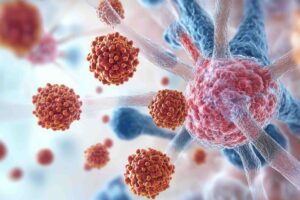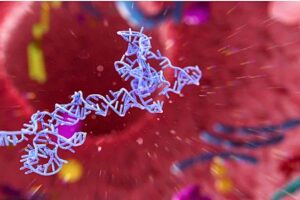What is already known
Inflammatory bowel diseases (IBD) include long-term inflammatory conditions, such as Crohn’s disease and ulcerative colitis, that affect the gastrointestinal tract. These conditions have been linked to alterations in the gut microbiota and malfunctions of mitochondria — organelles that play a key role in energy production. However, whether and how gut microbes and mitochondrial function are related is unclear.
What this research adds
Working in mice, researchers have found that mitochondrial dysfunction leads to drastic changes in the composition of gut microbiota that are associated with increased intestinal inflammation and tissue damage. Compared with mice with a typical gut microbiota, mice lacking gut microbes did not show the same level of inflammation and injury. Mitochondrial dysfunction also resulted in specific gene expression changes in the gut. These gene signatures could be observed in samples from people with Crohn’s disease, and they could be used to differentiate between active and inactive inflammation.
Conclusions
The findings may pave the way for new therapeutic strategies that target mitochondrial health to treat inflammatory conditions such as IBD.
Inflammatory bowel diseases (IBD) include long-term inflammatory conditions, such as Crohn’s disease and ulcerative colitis, that affect the gastrointestinal tract. Now, researchers have found a link between mitochondrial dysfunction in the gut and microbiota-dependent injury, revealing gene signatures that can differentiate between active and inactive inflammation.
The findings, published in Cell Host & Microbe, may pave the way for new therapeutic strategies that target mitochondrial health to treat inflammatory conditions such as IBD.
Previous studies have linked IBD to alterations in the gut microbiota and malfunctions of mitochondria, which play a key role in energy production. However, whether and how gut microbes and mitochondrial function are related is unclear.
To address this question, Elisabeth Urbauer at Technical University of Munich in Freising, Germany, and her colleagues studied the effects of disrupting the function of mitochondria in the guts of mice.
Gut inflammation
Mitochondrial dysfunction accelerated gut inflammation and injury associated with IBD. It was also linked with changes in microbiota composition, including a decrease in microbial species and alterations in the abundance of various microbes.
Compared with mice with a typical gut microbiota, mice lacking gut microbes did not show the same level of inflammation and tissue injury, underscoring the microbiota’s involvement in this process.
Among the microbiota changes associated with mitochondrial dysfunction, the researchers found that the levels of Bacteroides species were increased. An analysis of fecal samples from 468 people with IBD showed higher levels of Bacteroides linked to intestinal inflammation compared with healthy controls.
Metabolic alterations
Mitochondrial dysfunction also resulted in specific gene expression changes in the gut, the researchers found. These gene signatures could be observed in samples from people with Crohn’s disease, and they could be used to differentiate between active and inactive inflammation.
These results suggest that bacterial communities adapt to alterations in gut metabolism, but more work is needed to understand how such alterations promote the growth of particular microbes, the researchers say.
What’s more, they say, understanding the interaction between mitochondria and the microbiota could provide new insights into IBD and related conditions. “Targeting specific [mitochondrial] pathways or microbe-host circuits may yield therapeutic options in recurrent inflammatory pathologies in the intestine.”












